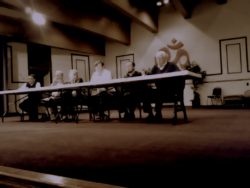 In a time when racial, political, economic and religious divisions in the United States are increasingly obvious, the people of one southern city, Chattanooga, Tennessee, are attempting, through dialogue, to understand the religious beliefs of one another. On a chilly November Monday evening a group of over fifty people gathered at a Hindu temple for the Sixth Interfaith Panel Discussion. The attendees and panelists were ordinary people, with extra-ordinary beliefs concerning the value of gaining knowledge and understanding of the faith traditions of one another.
In a time when racial, political, economic and religious divisions in the United States are increasingly obvious, the people of one southern city, Chattanooga, Tennessee, are attempting, through dialogue, to understand the religious beliefs of one another. On a chilly November Monday evening a group of over fifty people gathered at a Hindu temple for the Sixth Interfaith Panel Discussion. The attendees and panelists were ordinary people, with extra-ordinary beliefs concerning the value of gaining knowledge and understanding of the faith traditions of one another.
Although there were some younger persons in the room, most of the attendees were over forty. The interfaith panel consisted of a Christian, a Jew, a Hindu, a Muslim, and a Humanist. The moderator was a retired Christian minister. All listened respectfully to one another, as did the audience. A welcome change from the continual shouting in the current political atmosphere.
Remarkably, in this overwhelmingly Protestant Christian community, the panelists related it was actually rather comfortable and easy to live in Chattanooga. Difficulties, when they did occur, centered on experiences educating their children.
The Muslim father stated he experienced some difficulty working with his children’s public school in providing a place and time for his children to pray. He went on to say he was able to reach an accommodation with the school to allow for the necessary times and place.
The Jewish father related the difficulties his family experienced with public school religion classes. Classes centered on “doctrinal religion,” rather than a study of the Bible as historical and cultural literature, continue despite court decisions that such religion classes violate the rights not only of non-Christians, but also of Christians who do not espouse the specific doctrine of the teacher. Even though parents may opt out of such classes, the court noted children may be stigmatized because of their lack of participation.
The Hindu panelist stated Hindus are often “private” concerning religious matters. Indeed, since many Hindus are of Indian descent, they experience more discrimination because of the color of their skin rather than their religious beliefs.
Public prayer, ubiquitous in the South, was mentioned by several participants. The Jewish panelist stated while he was not opposed to public prayer per se, Jews felt excluded from public prayers in the name of Jesus Christ.
It was the Humanist who encounters the most negative experiences as a result of his lack of religious faith. Stating he feared some people would refuse to do business with him if they knew of his Humanist views. However, he went on the say the lack of religious faith “is not as much of an issue” today and his children did not experience discrimination in school.
The Christian panelist, the lone woman participant, acknowledged the ease with which she was able to educate her children in her faith. Indeed, the prevailing culture makes Christianity unavoidable.
Conversely, Jewish, Hindu, and Muslim families must be intentional in providing religious instruction for their children. Therefore, the extended family and faith community are essential in rearing children in the traditions and beliefs of their faith. With respect to holidays, sacred times, and practices, including food and clothing customs, the panelists asked for increased awareness and respect from Christians concerning which holidays are celebrated and how.
The good news is all present seem to enjoy what Americans say they value – the freedom and opportunity to worship and believe as one choses.
All of the panelists stressed the values that each faith and Humanists have in common: living by the Golden Rule, charity toward the poor and needy, and the importance of family. At the same time, each panelist acknowledged the need for more discussion and openness by the dominant Christian community in understanding and accommodating other religious beliefs. Such openness needs to occur not only at the organizational level, like the Interfaith Panel, but also at the individual and family level. They urged individual intentional action to become more open to bridging the gaps among the various religions. At the conclusion of the discussion during the question and answer period, a specific point was made concerning the need to comfort refugees who are “terrified” due to the rhetoric and tenor of the recent presidential campaign and election.
The formal meeting ended and the interfaith panel and audience gathered for food prepared by the women of the temple. There was an atmosphere of hospitality offered and accepted, coupled with a genuine desire to know one another and continue with the work of understanding the faith of others.
Also read Religious Diversity on the Road by Deborah Levine
- Maybe Some Silver Linings – by Gay Morgan Moore - March 15, 2021
- Interfaith Panel in the South: A Community Responds – By Gay Morgan Moore - December 7, 2016
- STEM Women Talk – By Gay Morgan Moore - March 14, 2015
